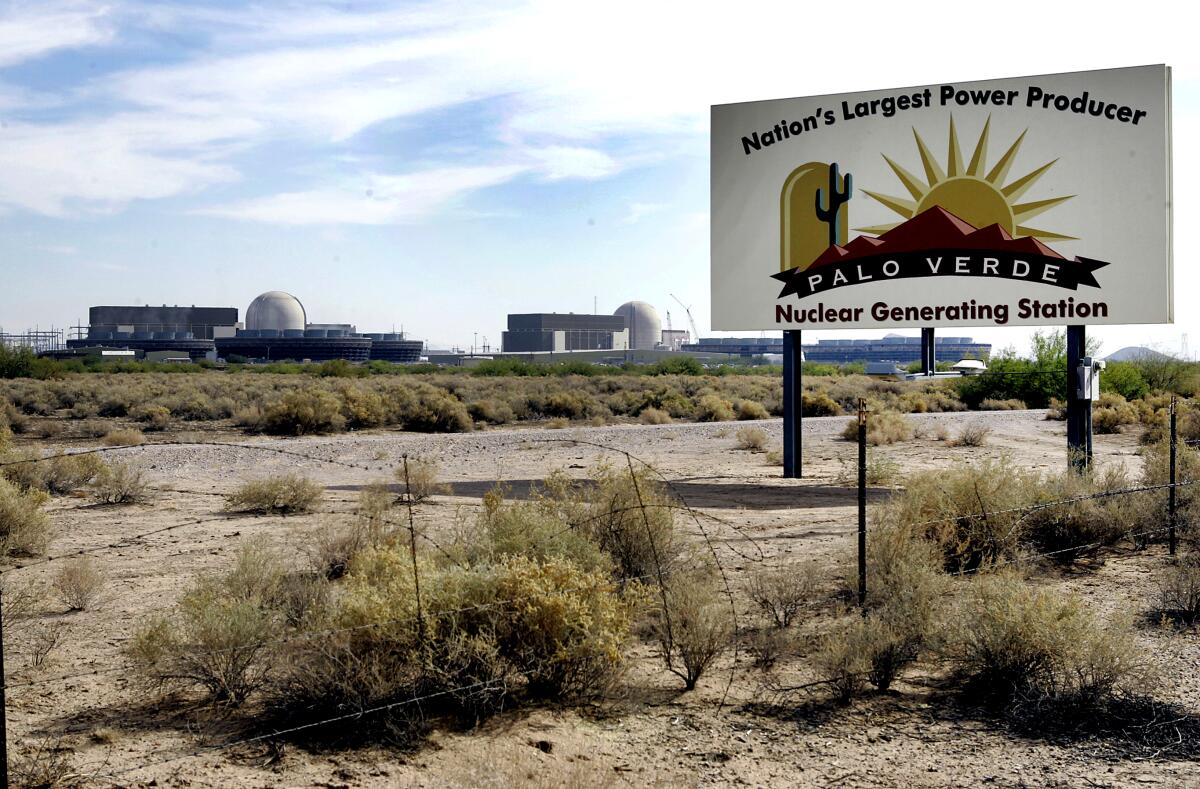Eight years ago this week — the last time Donald Trump was elected president of the United States — I offered a grim prognosis of what his ascendance might mean for the climate crisis.
“Twenty-five years of slow progress through international negotiations will probably deteriorate, locking in global warming far greater than the supposed ‘safe’ level of 2 degrees Celsius,” I wrote at the time.
I’m not sure if my analysis was too bleak, or not nearly bleak enough.
Newsletter
You’re reading Boiling Point
Sammy Roth gets you up to speed on climate change, energy and the environment. Sign up to get it in your inbox twice a week.
You may occasionally receive promotional content from the Los Angeles Times.
On the one hand, I was wrong about progress deteriorating. Heat-trapping carbon pollution has fallen in the U.S. since Trump was first elected, driven in part by low-cost solar and wind farms replacing coal plants. Forty percent of the nation’s electricity now comes from non-carbon sources, including renewables, nuclear and hydropower.
On the other hand, the U.S. and other countries still aren’t ditching fossil fuels nearly fast enough to limit heating to 2 degrees Celsius above preindustrial levels. Limiting the increase to 1.5 degrees would be even better.
Instead, hundreds of top climate scientists expect an average temperature hike of at least 2.5 degrees, according to a recent survey. That would be catastrophic — think bigger and more destructive wildfires, heat waves, storms, floods and droughts, probably fueling crop failures, refugee flows and geopolitical upheaval.
Did electing Trump in 2016 lock in that future?
I have no clue. Maybe it was already inevitable. Maybe it has only now become inevitable.
But this I know for sure: Even with Trump returning to the White House, giving up won’t help.
That’s why I’ll keep reminding you that limiting warming to 1.5 degrees requires slashing emissions 43% by 2030 and 60% by 2035, according to scientists. Even though those kinds of titanic shifts are unlikely — carbon pollution continues to rise globally — the numbers serve as a powerful reminder to look beyond the current moment.
In the same way that American democracy was never going to be saved or destroyed by a single election (see my previous column), the climate crisis won’t be won or lost in a day, or even a decade.
Daniel Day-Lewis portrays President Lincoln in director Steven Spielberg’s film “Lincoln.”
(DreamWorks Pictures / Twentieth Century Fox)
Two degrees of heating would be a lot worse than 1.5 degrees, and 2.5 would be even worse. But I’d much rather have 2.5 than 3 degrees. Every ton of carbon we keep out of the atmosphere is death and suffering avoided.
So yes, Trump’s election hurts. Full stop. Nothing I can say will make it better.
But it doesn’t diminish the need to work for a better world — for a habitable planet, and for a vibrant democracy in which everyone is treated equally. That need is greater now than ever.
Fortunately, there are avenues for action — climate and otherwise. State and local politics, the courts, nonprofits, volunteering, voter turnout, pushing big corporations to get off the sidelines. The path toward justice is narrower and more fraught, with a soon-to-be-president who has pledged to act like a dictator and boil the planet.
But there’s still a path. The work still matters. A lot changed on Tuesday, but not everything.
So let’s get to the rest of the news. Here’s what’s happening around the West:
POLITICAL CLIMATE
California voters approved Proposition 4, a $10-billion climate bond that will finance water recycling, clean energy and wildfire protection projects. Details here from my L.A. Times colleague Melody Petersen.
The environment was also on the ballot in other western states, and at the local level in California:
- Washington voters rejected a measure to eliminate the state’s carbon market, a key climate achievement of outgoing Gov. Jay Inslee. Another anti-climate measure that would block local governments from restricting the use of natural gas was narrowly leading, with thousands of votes left to count. (Seattle Times)
- Berkeley, one of California’s most liberal cities, overwhelmingly rejected a tax on natural gas consumption in large buildings. The money would have funded incentives for electric appliances. (Iris Kwok, Berkeleyside)
- In San Francisco, a controversial proposal to convert two miles of waterfront highway into a public park open to pedestrians and bikers, and closed to cars, appears likely to pass. (Heather Knight, New York Times)
- Residents of California’s Sonoma County rejected Measure J, which would have outlawed certain large farms — operations that produce lots of water and air pollution, including carbon. (Dana Cronin, KQED)
- If early results hold, Republicans are on track to hold all five seats on the Arizona Corporation Commission — a powerful agency with enormous sway over energy development. (Russ Wiles, Arizona Republic)

Arizona’s Palo Verde Nuclear Generating Station supplies some electricity to Los Angeles.
(Ross D. Franklin / Associated Press)
I’ve also been watching some U.S. Senate races in which environmental issues features prominently:
- In Montana, Republican Tim Sheehy defeated incumbent Jon Tester. The fact that a moderate Democrat lost to a wealthy Montana newcomer may be a sign that “the New Montana — and the New West — has more in common with Sheehy than with a seven-fingered farmer.” (Jonathan Thompson, High Country News)
- In Nevada, incumbent Democrat Jacky Rosen was closely trailing Republican challenger Sam Brown as vote-counting continued Wednesday. Although environmentalists didn’t all agree with Rosen on the best balance between solar energy development and conservation on the Silver State’s federal public lands, they banded together to oppose Brown, who has bashed renewable energy. (Wyatt Myskow, Inside Climate News)
- Utah residents elected John Curtis, a Republican who says he wants to tackle climate change, to the Senate seat being vacated by former GOP presidential candidate Mitt Romney. Curtis defeated a Democratic climate activist who accused him of pandering to the fossil fuel industry. (Hannah Schoenbaum, Associated Press)
As usual, the fossil fuel industry is working hard to influence our politics — even in California:
- A political action committee whose backers included oil companies Chevron, Phillips 66 and Valero was one of the top spenders in California this election cycle, doling out more than $11 million. This helps explain why even here, climate progress can be so difficult. (Anabel Sosa and Angie Orellana Hernandez, L.A. Times)
- Pacific Gas & Electric was one of the biggest utility spenders on federal campaigns this election cycle, as was Sempra Energy, parent of SoCal Gas and San Diego Gas & Electric. (Mario Alejandro Ariza, Floodlight)
- Elon Musk’s political action committee, which vigorously supported former President Trump, got a $1-million contribution from a coal executive. It’s less crazy than you might think. (Arielle Samuelson, Heated)
- Speaking of which — if you want to know how Musk went from climate champion to one of Trump’s most vocal and influential supporters, this story is for you. (Laura J. Nelson and James Rainey, L.A. Times)
It’s too early to know the specifics of how Trump’s presidency will affect climate and environmental policy at the federal and state levels. But we’ve got some pretty big clues. A few storylines worth following:
- Even if Democrats retake control of the U.S. House of Representatives — which was still a distinct possibility Wednesday, and which would make a repeal of President Biden’s landmark climate law all but impossible — Trump would have many options for slowing the clean energy transition. (Jeff St. John, Canary Media)
- Trump administration officials may have a chance to reject clean air rules submitted by California for federal approval, including a ban on the sale of new gasoline-powered cars by 2035. (Tony Briscoe, L.A. Times)
- Anti-vaccine activist Robert F. Kennedy Jr., who Trump has said could have a prominent role in health policy in his administration, wants to remove fluoride from drinking water. The U.S. Centers for Disease Control and Prevention has called adding fluoride to water, which prevents tooth decay, one of the last century’s greatest public health achievements. Kennedy, like Trump, loves conspiracy theories. (Corinne Purtill, L.A. Times)
AND EVERYTHING ELSE

The Mountain fire, fueled by Santa Ana winds, is torching homes and property in Ventura County this week.
(KTLA)
Somehow, I managed to read a few stories that weren’t about elections. Here’s what else is happening:
- California regulators are scheduled to vote Friday on expanding a controversial climate program that some environmentalists don’t love, and that other critics worry will raise gasoline prices. (Russ Mitchell, L.A. Times)
- Invasive golden mussels could make water delivery more expensive in California. (Ian James, L.A. Times)
- A Supreme Court battle over a Utah oil railway could have far-reaching consequences for a law that requires government agencies to study the environmental effects of their actions. (Jason Blevins, Colorado Sun)
- California’s fire season isn’t over. More than 10,000 acres are burning in Ventura County. (L.A. Times)
ONE MORE THING
Nah, I think I’ve had enough. See you next week.
This is the latest edition of Boiling Point, a newsletter about climate change and the environment in the American West. Sign up here to get it in your inbox. Or open the newsletter in your web browser here.
For more climate and environment news, follow @Sammy_Roth on X.

